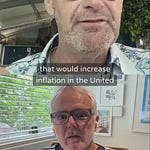TL;DR: The five things that mattered in Aotearoa’s political economy that we wrote and spoke about via The Kākā and elsewhere for paying subscribers in the last week included:
Confidence in the Government, as measured by Roy Morgan’s ‘Right Track/Wrong Track’ survey, collapsed in March by more than it fell for Labour in any one month of the late-2021 lockdowns in Auckland. See Thursday’s email.
Confidence about the Government and support for the three governing coalition parties fell the most among women, with young women the least supportive of National/ACT/NZ First and both young and old men most supportive.See Thursday’s email.
A review of council borrowing found central Government-driven debt limits are strangling big councils’ ability to borrow to build enough infrastructure for growth, although some councils are further tightening the reins with even lower self-imposed limits and by over-playing fears of credit rating downgrades. See Tuesday’s email.
Community housing providers and Kāinga Ora are putting social house building plans on hold because of a Government-wide freeze on capital and funding decisions for housing, transport and water infrastructure. See Wednesday’s email.
Prime Minister Christopher Luxon saying his Government has started “chunking down” its next 100-day plan into a series of items to arrange in “decision gates” — a business consulting phrase coined by McKinsey to refer to the prioritising of business cases. See Wednesday’s email.
What we talked about on ‘The Hoon’ on Thursday night
In this week’s podcast above of the weekly ‘Hoon’ webinar for paying subscribers at 5pm on Thursday night:
5:00 pm - 5:10 pm -
and Peter Bale opened the show with a discussion about a gender gap opening up in political views in Aotearoa-NZ.5.10 pm - 5.20 pm - Peter, Bernard, and
talked about reports questioning the expected fall in oil and gas emissions and predicting permanently higher food inflation because of climate change.5.20 - 5.35 - Peter and Bernard talked with
talked about US and Israeli exceptionalism on Gaza and how that makes AUKUS II much less attractive for our Government to join.5.35 pm - 5.55 pm - Peter and Bernard spoke with University of Victoria Associate Professor in Politics Lara Greaves on the gender gaps opening up in politics here and overseas.
The Hoon’s podcast version above was produced by Simon Josey.
(This is a sampler for all free subscribers. Thanks to the support of paying subscribers here, I’m able to spread the work from my public interest journalism here about housing affordability, climate change and poverty reduction around in other public venues. I’d love you to join the community supporting and contributing to this work with your ideas, feedback and comments.)
I produced an episode of When The Facts Change via The Spinoff, including this interview with Auckland Airport CEO Carrie Hurihanganui.
We also produce this 5 in 5 with ANZ daily podcast and Substack for ANZ Institutional in Australia, which you can sign up to via Spotify and Apple and Youtube for free.
Today we farewell Rod Oram. He was a colleague and friend for Lynn and I. Please take some time today to read more of his work here at Newsroom. There is a livestream link to his memorial service starting today at 11 am.
Ka kite ano
Bernard














Share this post